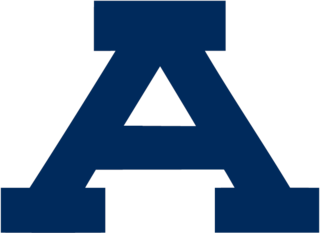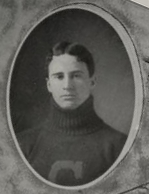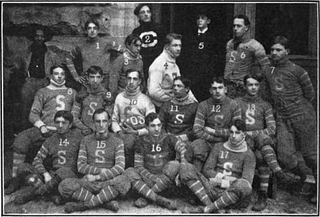
John William Heisman was a player and coach of American football, baseball, and basketball, as well as a sportswriter and actor. He served as the head football coach at Oberlin College, Buchtel College, Auburn University, Clemson University, Georgia Tech, the University of Pennsylvania, Washington & Jefferson College, and Rice University, compiling a career college football record of 186–70–18.

The 1917 Auburn Tigers football team represented Auburn University in the 1917 Southern Intercollegiate Athletic Association football season. It was the Tigers' 26th season and they competed as a member of the Southern Intercollegiate Athletic Association (SIAA). The team was led by head coach Mike Donahue, in his 13th year, and played their home games at Drake Field in Auburn, Alabama. They finished with a record of six wins, two losses and one tie.
The 1902 Georgia Bulldogs football team represented the Georgia Bulldogs of the University of Georgia during the 1902 Southern Intercollegiate Athletic Association football season. The Bulldogs compiled a 4–2–1 record, including victories over Auburn and Alabama and a 0–0 tie with Georgia Tech. The losses included Georgia's fourth consecutive loss to Sewanee. This was the team's second and final season under the guidance of head coach William A. Reynolds.
The Cumberland Phoenix football team represents Cumberland University in National Association of Intercollegiate Athletics (NAIA), primarily competing in the Mid-South Conference. The Phoenix formerly competed in the TranSouth Athletic Conference and Southern Intercollegiate Athletic Association.

Charles Vedder Sitton, also known as Carl, C. V. and Vet Sitton, was a baseball player and coach. He attended Clemson College, where he also played football, and later coached baseball for the Tigers.

The 1903 Clemson Tigers football team represented Clemson Agricultural College—now known as Clemson University—as a member of the Southern Intercollegiate Athletic Association (SIAA) during the 1903 college football season. Led by John Heisman in his fourth and final season as head coach, the Tigers compiled an overall record of 4–1–1 with mark of 2–0–1 in SIAA play.

The 1906 Clemson Tigers football team represented Clemson Agricultural College—now known as Clemson University—during the 1906 Southern Intercollegiate Athletic Association football season. Under first-year head coach Bob Williams, the team posted a 4–0–3 overall record with a mark of 4–0 in SIAA play. Fritz Furtick was the team captain.

The 1903 Vanderbilt Commodores football team represented Vanderbilt University during the 1903 Southern Intercollegiate Athletic Association football season. James R. Henry coached Vanderbilt for one season in 1903. His squad finished the season with a 6–1–1 record. The season was marred only by the upset loss to Cumberland. John J. Tigert and Bob Blake were both Rhodes Scholars.

The 1906 Vanderbilt Commodores football team represented Vanderbilt University during the 1906 Southern Intercollegiate Athletic Association football season. The team's head coach was Dan McGugin, who served his third season in that capacity. Members of the Southern Intercollegiate Athletic Association (SIAA), the Commodores played seven home games in Nashville, Tennessee at Curry Field, and finished the season with a record of 8–1 overall and 5–0 in SIAA.

David Hope Sadler was an American football player for John Heisman's Clemson Tigers of Clemson University. He was captain of the SIAA champion 1902 and 1903 Clemson Tigers football teams coached by Heisman, selected All-Southern the same years. One publication reads "Vetter Sitton and Hope Sadler were the finest ends that Clemson ever had perhaps." Sitton played on the left; Sadler on the right.

The 1916 Georgia Tech Yellow Jackets football team represented the Georgia Tech Golden Tornado of the Georgia Institute of Technology during the 1916 Southern Intercollegiate Athletic Association football season. Georgia Tech was a member of the Southern Intercollegiate Athletic Association (SIAA). The Tornado was coached by John Heisman in his 13th year as head coach, compiling a record of 8–0–1 and outscoring their opponents 421 to 20. Georgia Tech played its home games at Grant Field. One writer claimed the 1916 team "seemed to personify Heisman." This was the first team to vault Georgia Tech to national prominence.

The 1903 College Football All-Southern Team consists of American football players selected to the College Football All-Southern Teams selected by various organizations for the 1903 Southern Intercollegiate Athletic Association football season.

The 1906 College Football All-Southern Team consists of American football players selected to the College Football All-Southern Teams selected by various organizations for the 1906 Southern Intercollegiate Athletic Association football season. For some, the SIAA champion 1906 Vanderbilt Commodores football team made up the entire team. It would produce eight of the composite eleven. Owsley Manier was selected by Walter Camp third-team All-American. Vanderbilt won the SIAA championship.

The 1905 College Football All-Southern Team consists of American football players selected to the College Football All-Southern Teams selected by various organizations for the 1905 Southern Intercollegiate Athletic Association football season. Vanderbilt won the SIAA championship. Virginia Tech, an independent school, lost only to Navy and claims a southern championship for 1905.

Connor "Jock" Hanvey was an American college football player and coach.

The 1903 Cumberland Bulldogs football team represented Cumberland University in the 1903 college football season. The team was a member of the Southern Intercollegiate Athletic Association (SIAA), compiling a 6–1–1 record. The Bulldogs notably beat Vanderbilt and tied John Heisman's Clemson at year's end in a game billed as the "SIAA Championship Game." They also beat Alabama, LSU, and Tulane in five days. The school claims a share of the SIAA title. It has been called "the best football team in the history of Cumberland."
The 1903 Southern Intercollegiate Athletic Association football season was the college football games played by the member schools of the Southern Intercollegiate Athletic Association as part of the 1903 college football season. The season began on September 25.

The 1903 Sewanee Tigers football team represented the Sewanee Tigers of Sewanee: The University of the South in the 1903 Southern Intercollegiate Athletic Association football season.

The 1906 Georgia Tech Yellow Jackets football team represented the Georgia Institute of Technology during the 1906 Southern Intercollegiate Athletic Association football season. In the third season under coach John Heisman, Georgia Tech posted a 6–3–1 record.
The 1906 Davidson Wildcats football team represented Davidson University in the 1906 college football season. According to Fuzzy Woodruff, the team threw the first forward pass in the South.















